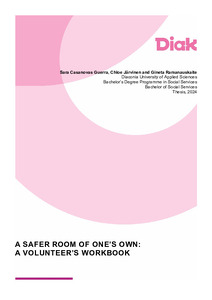A safer room of one's own: a volunteer's workbook
Casanovas Guerra, Sara; Järvinen, Chloe; Ramanauskaite, Gineta (2024)
Casanovas Guerra, Sara
Järvinen, Chloe
Ramanauskaite, Gineta
2024
All rights reserved. This publication is copyrighted. You may download, display and print it for Your own personal use. Commercial use is prohibited.
Julkaisun pysyvä osoite on
https://urn.fi/URN:NBN:fi:amk-202404186901
https://urn.fi/URN:NBN:fi:amk-202404186901
Tiivistelmä
ABSTRACT
Sara Casanovas Guerra, Chloe Järvinen and Gineta Ramanauskaite
A safer room of one’s own: A volunteer’s workbook
69 p.
Published (Spring, 2024)
Diaconia University of Applied Sciences
Bachelor’s Degree Programme in Social Services
Bachelor of Social Services
This development-based thesis addresses the need of Safer space training for volunteers. Volunteers often work directly with service users, creating events and services, so they require the knowledge and skills to create Safer spaces. There is a need for volunteers to have an understanding of how interacting factors such as combined identities and systems of power impact us all. As volunteers come from varied professional and educational backgrounds, there is a need for volunteer training that supports volunteers’ learning and reflective process and that is motivating.
The subject of Safer space was chosen to meet the needs of our thesis partner MONIKA – Multicultural Women’s Association and to contribute to a change within the social field that recognises the importance of Safer space considerations. The objective of this thesis is to support MONIKA in the incorporation of Safer space approach into their volunteer training by creating a reflective workbook on the topic of Safer space.
The final output of this thesis was a self-reflective workbook on Safer space approach for volunteers. The workbook is written from an intersectional perspective as research of related materials showed intersectionality to be the foundation of the Safer space approach. Key concepts related to Safer space including power and privilege, anti-racism, anti-discriminatory practice, and anti-oppression are introduced in the workbook. A reflective approach is used to demonstrate the interconnectedness of the topics, deepen understanding, and support volunteers in analysing their own experiences and methods of working with service users. Reflection of the topics as not just theories but factors that affect us all in varied ways gives them more importance, so several different opportunities and methods for reflection have been included in the workbook.
This thesis and accompanying workbook are intended to provide information, reflections, and understanding for volunteers, organisations, and all readers. All organisations and readers are invited to examine their services from a Safer space perspective and to make a Safer space approach the basis of training, policies, and procedures with an overarching goal of improving the inclusivity of volunteer services.
Keywords: Safer space, volunteer training, reflective practice, intersectionality.
Sara Casanovas Guerra, Chloe Järvinen and Gineta Ramanauskaite
A safer room of one’s own: A volunteer’s workbook
69 p.
Published (Spring, 2024)
Diaconia University of Applied Sciences
Bachelor’s Degree Programme in Social Services
Bachelor of Social Services
This development-based thesis addresses the need of Safer space training for volunteers. Volunteers often work directly with service users, creating events and services, so they require the knowledge and skills to create Safer spaces. There is a need for volunteers to have an understanding of how interacting factors such as combined identities and systems of power impact us all. As volunteers come from varied professional and educational backgrounds, there is a need for volunteer training that supports volunteers’ learning and reflective process and that is motivating.
The subject of Safer space was chosen to meet the needs of our thesis partner MONIKA – Multicultural Women’s Association and to contribute to a change within the social field that recognises the importance of Safer space considerations. The objective of this thesis is to support MONIKA in the incorporation of Safer space approach into their volunteer training by creating a reflective workbook on the topic of Safer space.
The final output of this thesis was a self-reflective workbook on Safer space approach for volunteers. The workbook is written from an intersectional perspective as research of related materials showed intersectionality to be the foundation of the Safer space approach. Key concepts related to Safer space including power and privilege, anti-racism, anti-discriminatory practice, and anti-oppression are introduced in the workbook. A reflective approach is used to demonstrate the interconnectedness of the topics, deepen understanding, and support volunteers in analysing their own experiences and methods of working with service users. Reflection of the topics as not just theories but factors that affect us all in varied ways gives them more importance, so several different opportunities and methods for reflection have been included in the workbook.
This thesis and accompanying workbook are intended to provide information, reflections, and understanding for volunteers, organisations, and all readers. All organisations and readers are invited to examine their services from a Safer space perspective and to make a Safer space approach the basis of training, policies, and procedures with an overarching goal of improving the inclusivity of volunteer services.
Keywords: Safer space, volunteer training, reflective practice, intersectionality.
